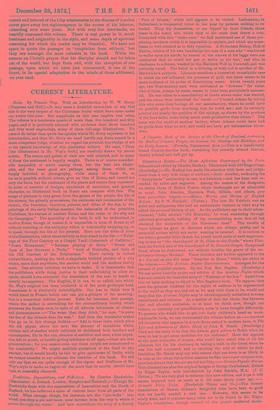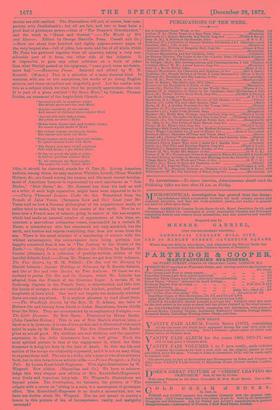CHRIST3IXS BOOKS.—The Home Affections Pourtrayed by the Poets.
Selected and edited by Charles Mackay. Illustrated with 100 Engravings. (Routledge.)—Mr. Mackay has made his selection with taste and judge- ment from a very wide range of authors,—their number, reckoning the " Anonymous " authorship as one, is a hundred,—and has been well se- conded by artist and engraver. Among the names of the designers, we notice those of Birket Foster, whose landscapes are as admirable as usual, John Absolon, Harrison Weir, Millais, and others, quos nunc perscribere longum.—Homes, {forks, and Shrines of English Artists. By F. W. Fairholt. (Virtue.) The late Mr. Fairholt was an artist and antiquarian who had an enthusiastic interest in what may be called the personal history of art. As the publishers say in their adver- tisement, "Like another ' Old Mortality,' he wont wandering through suburban graveyards, rubbing off the accumulating moss that all but obscured the memorials of the illustrious dead." The results of these labours he gave in sketches which are always pretty, and in memorial notices which are never wanting in interest. It is curious to see what a graceful little sketch his pencil could make of such unpromis- ing scenes as " the churchyard of St. Giles-in-the-Fields," where Flax- man lies buried, and of the churchyard of St. James's Chapel, Hampstead Road, where he discovered, not without trouble, the grave of the un- fortunate George Morland. These sketches and notices appeared in the Art Journal. as also did some "Rambles in Rome," which are added to the volume.--The Arabian iVights' Entertainments. Arranged for the perusal of youthful readers. By the Hon. Mrs. Sugden. (Routledge.) We can never heartily praise any edition of the Arabian Nights which does not contain the beautiful story of " Fallanar of the Sea." Apart from this we have nothing to object to Mrs. Sugden's book. We suppose that even the greatest sticklers for the rights of authors to bo represented to the world as they are, and not as wo may wish them to be, would not deny that the Arabian Nights may bo advantageously submitted to some curtailment and excision. As a matter of fact, the choice lies between that and absolute exclusion, so at least wo think now, though our fathers, or certainly our grandfathers, seem to have thought differently. To parents who would like to put into their children's hand an unex- ceptionable book, we can recommend the volume before us.—Another old favourite who appears in a new dress, suited to modern taste, is The Life and Adventures of Rouen Hood, by John 13. Marsh. (Routledge.) Used not the story to be that the Abbess gave poison to Robin when he went to her to get some medicine for his sickness ? Hero she appears as the most estimable of women, who would have cured him of all his ailments, but for his obstinacy in taking a walk in the forest when he was but half recovered, and so catching the cold of which he died. Doubtless Mr. Marsh may say with reason that one story is as likely to be true as the other, but in these matters we like stare super antiguas vial, provided always that the vim are not too dirty.— German Popular Stories. With illustrations after the original designs of George Crnikshank. Edited by Edgar Taylor, with introduction by John Ruskin, M.A. (J. C. Hotten.) We are very glad to welcome this new edition, and hope it will amuse boyhood now as mach as it did some thirty years ago. — Grinn's Fairy Piles. (Frederick Warne and Co.)—The former translations of Messrs. Grimm's delightful tales have been so good that we hardly needed a new one. However, this seems to be nicely done, and it contains many tales not to be found in Mr. Edgar Taylor's translation, though several of the quaint mediaeval monk- stories are still omitted. The illustrations will not, of coarse, bear com- parison with Ornikshank's ; but all are fair, and two at least have a good deal of grotesque power,—that of "The Dragon's Grandmother," and the witch in " Hand and Grettel."— The World of Wit and Humour. Edited by George Manville Fenn. Cassell and Co.) —Here are about four hundred and eighty pages—octavo pages of the very largest size—full of jokes, bon-mots, and fan of all kinds, which Mr. Fenn has gathered together from all quarters, taking a very con- siderable part of it from the other side of the Atlantic. It is impossible to pass any other criticism on a book of jokes than what Martial passed on his epigrams, "some good, some moderate, more bad."—Humorous Poems. Selected and edited by W. M. Rossetti. (Mozon.) This is a selection of a more classical kind. It contains, with one or two exceptions, the works of no living English authors, and these exceptions are singularly good. Let the reader note this as a subject which we trust that he properly appreciates—the cat. It is part of a piece entitled "My Manx Minx," by Orlando Thomas Dobbin, an ornament of the Anglo-Irish Church :—
On window-sill, in sunshine, pinks Her dainty paws and fur, neat MINI.
"Simples muntlitiis, all the sminks
And smears of sluthood shuns spruce MINI
"Soprani trill their tank-a-tanks; My prima cat-Writes MINI.
"Horns blare, drums beat, and cymbal clinics, No mmesk equals mews of MINI.
"Hie richest creams. nectareous drinks, Her master sets aside for MINI.
"From human cares and snares he shrinks, To spend serener hours with MINX.
" The Dean's rare taste in hill precincts Pets wild ducks : I pet wilder MINI.
"Of the cat world the pink of pinks Is tailless, peerless, schonsle MINI.
" Er ea, twinned, the Bard enlinks
The names for ever: OTHO, MINI."
Otho, it should be observed, stands for 0. Two. D. Living American authors, among whim we may mention Whittier, Lowell, Oliver Wendell Holmes, &c., are found among the names, and the most recent develop- ment of American humour is represented by such specimens as " Jem Blndso," "Bret Harte," &o. Mr. Rossetti has done his task as well as a critic of such high reputation might have been expected to do it. —Thirty Thousand Leagues Under the Sea. Translated from the French of Jules Verne. (Sampson Low and Co.) Last year Mr. Verne told us how a German philosopher of his acquaintance made, or rather tried to make, his way to the centre of the earth. Now he re- lates how a French man of science, going in search of the sea-serpent. which had made an unusual number of appearances at this time, en- counters a marvellous submarine vessel, commanded by a certain M. Nemo, a misanthrope who has renounced not only mankind, but the earth, and loathes and rejects everything that does not come from the sea. There is the usual mixture of a smattering of science with the wildest extravagance, the extravagance here being, perhaps, less happily conceived than it was in "The Journey to the Centre of the Earth."-- Sleepy Forest, and other Stories for Children, by Eustaoe N. Condor (Strahan), is a collection of prettily-written stories of the fanciful didactic kind.—From Mr. Nimmo we get four little volumes, The Two Sisters, by M. M. Pollard ; The Sea and the Savages, by Harold Lincoln ; Summer Holidays at Silversea, by E. Rosalie Salmon, and Out at Sea and other Stories, by Two Authors. Of these we are inclined to prefer The Sea and the Savages, which Mr. Lincoln. has adapted from the French of the Comtesss Sevin A certain M. de Rosbonrg, Captain in the French Navy, is shipwrecked, and falls into the hands of savages, who are certainly the kindest, gentlest, and most hospitable of their kind. One need not inquire too anxiously whether there are such anywhere. It is anyhow pleasant to read about them. —The Woodleigh Stories, by the Rev. H. C. Adams, are tales of Hebrew life and history from David to Judas Maccabseas, drawn chiefly from the Bible. They are accompanied by an explanatory dialogue.
The Little Drummer. By Bret Marto. Illustrated by Henry Banks. (John Camden Mottos.) This is one of Bret Harts's shortest tales,— short as it is, however, it is one of true pathos, and is illustrated with much spirit in sepia by Mr. Henry Banks. The five illustrations Mr. Banks gives us are all good. His children are real children, and the sensitive expression in the little drummer's face is well given. Mach the most spirited picture is that of the engagement in which the little drummer is doing his duty in the face of death. In this the life and motion of the troops are admirably expressed, and it is not an easy thing to express these well. The tale is a trifle, only a page or two of an ordinary book, but in this form it is an artistic trifle.—Prince Perrypets : a Fairy Tale. By Louisa Knatchbull-Hugessen. With eight illustrations by W. Wiegand. New edition. (Macmillan and Co.) We have to acknow- ledge this very elegant new edition of Mrs. Knatehball-Hagessen's very lively and ingenious fairy tale. Mr. Wiegaud's illustrations are beyond praise. The frontispiece, for instance, the picture of "The cripple with a crown on "sitting in a oave, is a masterpiece of grotesque effect. Mrs. Knatchbull-Hugessen is no doubt a monarchist, but we have our doubts about Mr. Wiegand. Has he not meant to convey a lesson in this picture of his, of incompetence, vanity, and malignity
crowned?



































 Previous page
Previous page